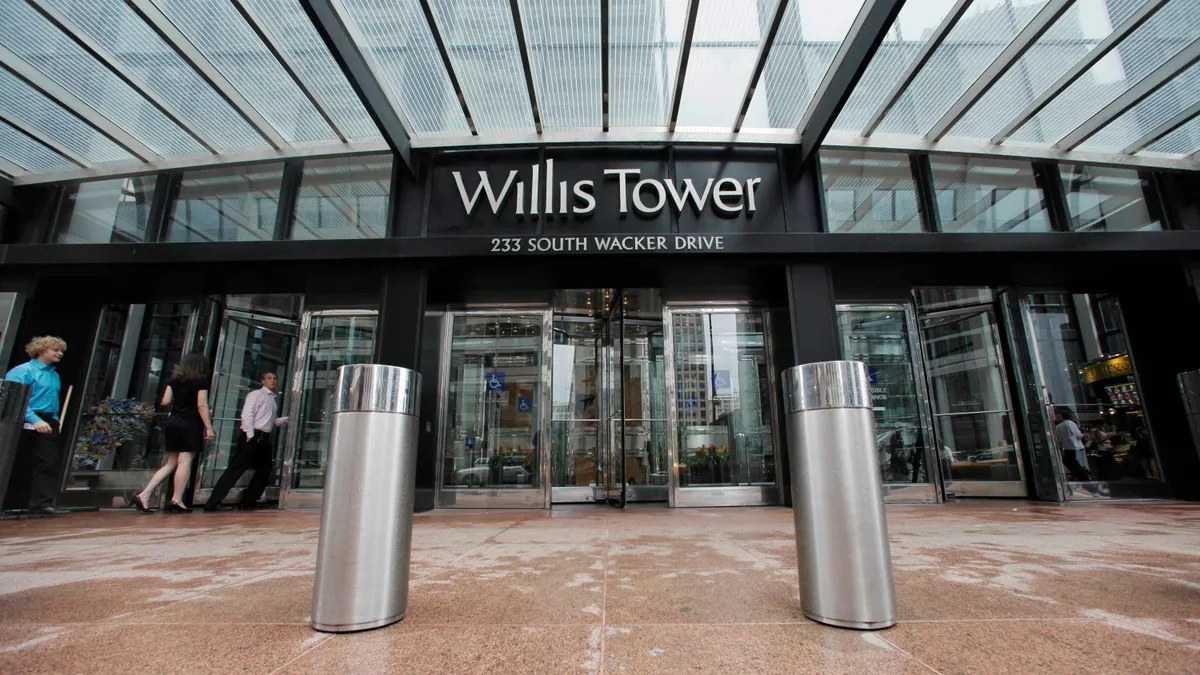Pay practices at WTW — the global insurance broker and advisory firm formerly known as Willis Towers Watson — fall short of the company’s guidance to employers, according to a handful of current and former employees of the company’s Via Benefits Insurance Services division in Richardson, Texas.
Employees at the Richardson office, located in suburban Dallas, said that WTW last rolled out base pay increases of $2 per hour in July 2022. That news was of little consolation to those who said they saw few changes to their base pay over several previous years.
In a series of interviews, workers described to HR Dive base pay rates that generally track market data, but said they face moving targets for bonuses and have been ignored or brushed off when raising pay concerns. Those issues persisted as the firm continued to advise other employers to adopt transparent pay practices and approach compensation concerns with an eye toward retention.
One current employee, Wilfred Ignace, said WTW’s practices at the Richardson office contrast with the company’s position as an advisory firm to HR departments and employers worldwide.
“We’re in the conference calls,” Ignace said. “They talk about the annual raises. They talk about integrity. They talk about the [WTW] values. They talk about teamwork. This is something that the company actually preaches, and I believe they believe it. But I think that here, that stops at the door.”
In emails to HR Dive, WTW said that it is committed to engaging with employees on issues such as pay and has taken steps to improve compensation, including implementing raises for employees at the Richardson office last year.
Repeated complaints about pay increases
The national mean hourly wage for customer service representatives in the “agencies, brokerages and other insurance related activities” sector was $20.45 in May 2021, according to data from the U.S. Bureau of Labor Statistics. For the Dallas-Fort Worth-Arlington area in which the Richardson employees are based, the mean hourly wage for all customer service representative roles was $19.09 during that time.
Data from Payscale offers a similar picture: The average hourly wage for benefits advisor roles in Richardson was $19 in June 2019. As of February 2023, the median hourly wage for benefits advisor roles nationally is $19.37 per hour, according to Payscale.
Former WTW benefit advisor Ambria Gibson told HR Dive she began working for WTW in 2014 as a temporary employee during the company’s fall enrollment season making $18 per hour and continued that work the following fall. At the end of her assignment in 2015, Gibson was offered a permanent position making $18.50 per hour.
Gibson, who was terminated in 2022 prior to the July raise, said she had not received any increases in the roughly seven years since she had been made permanent in 2015. Gibson said she and others frequently raised concerns about pay in team meetings, but that managers did not follow through on assurances that the subject would be addressed.
“They made it seem like every year they were going to give us a raise, and they never did,” said Gibson. “That was always something that all of us talked about, and it was just pushed off like, ‘Oh, we’re working on it.’”
A current employee who did not wish to be named shared similar information about rates and raise frequency. The employee said they stay at WTW because the job fits their schedule.
Attempts to reach WTW leadership
Like Gibson, Ignace reached out to WTW about the company’s pay practices. He began work at the Richardson office in 2013 just as WTW was acquiring the facility. The transaction was part of WTW’s acquisition of Extend Health, which WTW described at the time as the “largest private Medicare exchange in the United States.”
Ignace and his co-workers at Via Benefits help operate WTW’s individual marketplace outsourcing business for pre-Medicare and Medicare-eligible retirees. Documents viewed by HR Dive show that Ignace began working for Extend Health as a temporary employee in 2013, with his earliest recorded wage rate as $17 per hour. Ignace said WTW made him a permanent employee in 2015 and gave him a raise of 50 cents per hour.
In the nearly eight years that followed, Ignace received one increase to his base pay. He took a temporary supervisory assignment during which he earned as much as $24 per hour; when that assignment ended, his pay was reduced to $21.25 per hour. With the July 2022 increase, he now makes $23.25 per hour.
Ignace told HR Dive that he is “not doing horrible” at his current rate, but as a temporary supervisor, he said he managed employees who were struggling to get by. Workers would ask Ignace about raises, and he, in turn, would take the issue to management at Via Benefits as well as to representatives at WTW’s corporate levels.
Often, Ignace said, management told him the company planned to address the subject of raises “soon.” At other times, Ignace said he was rerouted to his manager or his questions were ignored altogether.
In one example, HR Dive viewed a copy of an email Ignace sent in October 2021 to Kristy Banas, WTW’s CHRO, in which he wrote that he was “hoping to get an opportunity to meet with you to discuss a few concerns that I believe may require a greater oversight from HR.”
“As we’re getting ready to start the busy season of Medicare enrollment, there are a few questionable practices that are happening at the divisional level that may not be supported by the overall Corporate Culture,” the email to Banas continued. “As a tenured employee, I have made various observations through the years and many of which have not been addressed by divisional leadership.”
In a reply email, Banas wrote that Ignace should first contact Susan Oehlsen, senior director and global talent advisor, benefits delivery and administration support at WTW, as the “point of escalation” and that “if you feel that discussion is unsatisfactory then of course you can find time with me as well.”

In an email to HR Dive, Ignace said that when he informed Oehlsen about the lack of pay increases at the Richardson office, “she was shocked.”
Banas and Oehlsen did not respond to HR Dive requests for comment. In an email, WTW said it took many factors, including employee feedback, into account when it decided to make pay adjustments for workers at the Richardson facility in July 2022.
The company said it “regularly elicits colleague feedback” via engagement surveys and town halls and that employees are encouraged to raise questions and find information through a variety of channels, including team leaders, HR representatives and the company’s internal self-service and support portal, which WTW said is accessible to all employees.
“WTW has a history of continually reviewing pay levels and incentives to ensure our total reward offerings are market competitive and to improve total rewards for all Via Benefits colleagues,” the company said. “We will continue to ensure our colleagues’ total reward position remains competitive, a key consideration in our annual budgeting processes.”
A bonus structure that came up short
Aside from their base pay, benefit advisors at the Richardson office have the opportunity to earn bonuses. Gibson said Via Benefits uses a tiered bonus structure that categorizes employees based on seniority. ”When I first started at tier one, my bonus was $750, then as I moved up, my bonus went from $750 a month to $1,000 a month,” Gibson said.
To earn her full bonus, Gibson said she had to meet certain metrics. These varied from the number of new clients Gibson interacted with to the number of dental or vision plan applications she collected. “They had different numbers you would have to meet and if you met those numbers, you would get the full bonus for that section.”
The requirements for a given bonus could be difficult to meet at times, according to Gibson. During her last experience amid WTW’s busy fall 2021 open enrollment season, Gibson said she had the opportunity to earn a $1,000 bonus if she hit certain metrics for outbound calls. Despite being sick with COVID-19 during this time, Gibson said she continued to work since she could do so from home and did not want to miss out on the bonus.
But Gibson said she never saw a cent of that $1,000, despite clocking into work every day for two weeks straight while sick.
Gibson recounted a tearful phone call with a WTW supervisor after finding out that she had lost out on the bonus. “I sat on the phone with this woman, crying,” she said. The manager reportedly explained that Gibson did not qualify for the bonus because she did not use a WTW-preferred template while making the calls and did not take notes from her calls in the manner her manager preferred.
Ignace said WTW is “always shifting the goal posts” with its bonus structure, stating that by mid-year, his structure for 2022 had already changed “six or seven times.”
“You would sneeze, and they would find a way to take [your bonus] away from you, and there would be no type of recourse,” Ignace said. “It’s not like these people are horrible workers. They’re doing the job above and beyond, and it’s just not happening. At this point, it’s become a joke.”
WTW did not respond to questions on the company’s bonus structure for benefit advisors at the Richardson office.
Temporary employees work multiple years
All of the WTW employees who spoke to HR Dive began at Richardson as temporary employees, ineligible for paid time off, among other benefits. Though some, like Ignace and Gibson, were able to transition to permanent roles in one to two years, others have been kept on as temporary employees for much longer durations of time.
One former employee who asked not be named told HR Dive she first worked for Extend Health during the 2013 and 2014 fall enrollment seasons. She was hired again for 2015’s enrollment season but said WTW kept her on as a temporary employee beyond the end of the season.
“I don’t understand how they got by with it."

Former benefit advisor, WTW
She continued working 40 hours per week for years, into 2019. She was eligible for a health insurance plan, for which she paid two-thirds of the premium, and maintained this coverage until 2018, when she became eligible for Medicare.
“I don’t understand how they got by with it,” the employee said of her temporary employment arrangement. “You’re working full time. I hardly ever took a day off unless I was sick because I needed the money, because I wasn’t going to get paid for it if I took time off.”
The employee said she asked her supervisor multiple times about being made permanent. “He would talk to his manager on the phone and their hands were just tied,” she added. “They didn’t know when it was going to happen.”
Eventually, the employee said she was made permanent in 2019 but left in 2020 due to a change in her work assignment.
In an email to HR Dive, WTW said that alongside the July 2022 pay adjustments for employees at the Richardson facility, the company also converted some temporary employees to permanent employees with company-subsidized benefits, including medical, dental and vision benefits; company-paid life insurance; a company-funded pension plan; paid time off; paid holidays; and participation in a 401(k) plan including a company match.
“We hire a number of temporary people for our busy open enrollment season and these people are not offered the same benefits as our full-time permanent colleagues,” WTW said. “The seasonal role is a full-time temporary role and accordingly, the role may end at the end of the enrollment season unless extended by WTW based upon business requirements. Each employment category has its own benefit plan program eligibility attributes.”
An ‘emotional toll’
In the past year, WTW analysts have published a variety of articles on the subject of pay strategy and the competition for talent during the Great Resignation.
In one June 2022 article, WTW staff wrote that employers should respond to employee concerns about pay in part by reminding employees about “your overarching pay philosophy, which is grounded in paying competitively based on the supply and demand of labor in each market in which you compete for talent.” The same piece suggested that employers focus on retention in part by understanding how inflation affects employees and addressing their needs through pay and other total rewards programs.
A 2023 WTW article on employee pay trends advises employers to “ensure your salary increase process is transparent and emphasizes the connection between salary increases and business performance.” WTW also recommended prioritizing communication and education about the factors that influence company pay philosophy, particularly during a period in which employees may be concerned about inflation.
“In the end, if employees raise ‘real-time data’ they find online to show they are getting a pay cut because your salary increases don’t match inflation, you have some work to do to educate them about basic economics and labor markets,” according to the 2023 article. “Don’t underestimate the importance of this education and communication effort.”
But for Ignace, it is exactly the lack of sufficient communication, as well as opaque pay policies, that have made it difficult for him to believe in the same values that WTW executives have talked about at company meetings.
“You’ve been at the company for all these years and you’re constantly being lied to,” Ignace said. “It’s an emotional toll on me, because I feel like I’m being part of a lie.”





















